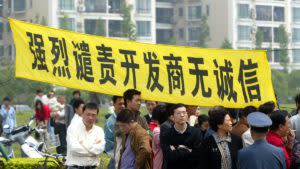Homeowners in China take to the streets to protest against falling property prices
Chinese new home prices rose by 1.4% in August, and 7% over the past year, according to official data from China's government.
However, there are increasing reports of steep price declines for new homes in some Chinese cities.
Some homeowners are so aggrieved that they're protesting against price reductions from developers.
If you believe the official data from the Chinese government, thinks are going swimmingly in China's property market.
Based on latest figures from China's National Bureau of Statistics (NBS), new home prices across 70 major cities surged by 1.4% in August, accelerating from a 1.1% increase in July.
The result left prices up 7% from a year earlier, the fastest increase in a year.
As seen in the chart below, the official data suggests policymakers have successfully engineered another soft landing for the property market, utilising restrictions on home purchases and sales of varying degrees across the country to help cool market conditions without leading to an outright decline in prices.
However, while the official government data suggests all is well, anecdotal evidence in some parts of the country suggests something's not right.
Prices are falling quickly in some areas, and homeowners aren't happy about it.
They're actually protesting against price falls.
According to the Financial Times, homeowners in Shanghai and other large cities such as Xiamen and Guiyang took to the streets earlier month to demand refunds on their homes after property developers cut prices on new properties to stimulate sales.
"Dozens of angry homeowners descended on the sales office of a complex [in Shanghai] that offered 25% discounts to demand refunds, causing clashes that damaged the sales office," the FT said, citing social media posts that have since been removed by Chinese censors.
In one post from Pingdingshan, a city in China's north, one protester carried a banner that read: "property owners tearfully cry out on their knees for the government to serve the people”.
The protest was believed to have been sparked by a property developer who cut prices by 20%.
According to the NBS, new home prices in Shanghai new home prices rose by 0.1% in August, leaving the decline on a year earlier at 0.2%, the same pace reported in July. Those in Pingdingshan increased by 0.7% during the month, and 6.8% over the year.
Data for September won't be released by the NBS until October 20.
However, even before it arrives, the unrest over falling property prices has some experts convinced that a new downturn has begun.
“Judging from our conversations with developers, September showed a price decline,” Cindy Huang, director of corporate ratings at S&P Global Ratings, told the FT.
Liu Lu, a property market researcher at the Southwestern University of Finance and Economics agrees with Huang's assessment, warning “the downturn in the property market has just begun".
"People bought at the peak of prices in 2017, and now they feel aggrieved,” Liu said.
He told the FT that there were similar protests seen in 2014 -- a period when prices fell across the country -- although, given the higher base effect following recent price gains, he said investment losses on this occasion could be “much larger”.
Adding to signs of a renewed slowdown, data from property researcher CRIC revealed property sales by floor area, often used as a leading indicator of demand, fell by 27% in China’s Golden Week holiday earlier this month.
In response to weakening demand, Reuters reports many Chinese property developers are going to increasingly extreme lengths to entice buyers, offering free cars, downpayments of as little as 10% of the purchase price and well as price cuts by as much as 30%.
"Looking forward, as developers are facing quite big capital pressure and a hot property market in the past two years have overdrawn part of the future demand, so the market is facing relatively large pressure,” Xin Shen, an analyst at CRIC, told Reuters.

 Yahoo Finance
Yahoo Finance 


